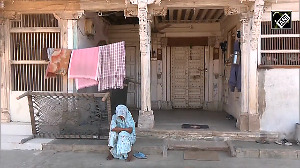Lieutenant General J F R Jacob served with Lieutenant General Jagjit Singh Aurora on the eastern front in the 1971 war. General Jacob made the arrangements for the surrender ceremony in Dhaka, where General Aurora accepted the document of surrender from Pakistan's General A A K Niazi.
General Jacob, who, after his retirement from the Indian Army, has served as governor of Goa and Punjab, recalls those heady days of December 1971 and his association with General Aurora, who passed away on May 3 in New Delhi.
General Aurora had a mission in mind -- organising the Mukti Bahini (the guerrilla force that fought against the Pakistan army in then East Pakistan) into a fighting unit. Of course, General Aurora and I did not agree on many points. While he wanted to take the cities and towns in then East Pakistan before moving forward, I realised we had little time to do that. I suggested to him that we should bypass the towns because taking them would mean loss of time.
On December 13, 1971 the United Nation Security Council was hotly debating the developments in then East Pakistan. The Americans came up with a proposal for a ceasefire and the Indian troop withdrawal. The Russians vetoed the proposal but they also told the Indian government that they would not exercise the right again. This created havoc at Army Headquarters. We had no time on our hands.
'You are the brains behind my moustache'
General (later Field Marshal S H F J) Manekshaw, the Chief of the Army Staff, told me to proceed to Dhaka to force General Niazi, the governor of East Pakistan, to surrender. I flew to Dhaka and drove to where General Niazi was based and showed him the surrender documents. He read the conditions and said he would not sign it. I took the paper away from him and told him I would consider that he had read the paper and agreed to surrender.
December 16, 1971 was a historic day. I went to the airport to receive General Aurora. There was an entourage with him, which included his wife, and we drove straight to the racecourse where I had arranged for the surrender ceremony. He was given a guard of honour by both Indian and Pakistani troops. There was a table with two chairs -- General Aurora sat on one side and General Niazi on the other.
General Niazi signed the document without bothering to read it. He was in tears. The two men did not speak to each other. General Aurora signed the document on behalf of the Indian Army, accepting the surrender of 90,000 officers and men. The biggest surrender in history.
The crowds were becoming restless. They started shouting 'Joi Bangladesh' and 'Amar Sonar Bangla.' They rushed towards General Niazi to try and lynch him. We had a difficult time. We put General Niazi in a jeep and took him to a pre-arranged location where he was to be kept under detention.
An exclusive interview with General Aurora
It was a great victory and General Aurora being the commander deserves all the credit. But I must add that the victory also belonged to the 1,200 officers and men of the Indian armed forces who laid down their lives to liberate Bangladesh.
General Aurora was a fine gentleman. A very fine soldier. I knew him from the time when he was at the staff college as an instructor. A physically tough and competent officer, he was liked by everybody. He had the great quality of being able to carry people with him. He was a thinker, a competent officer and someone very easy to work with.
As told to Chief Correspondent Onkar Singh






 © 2025
© 2025